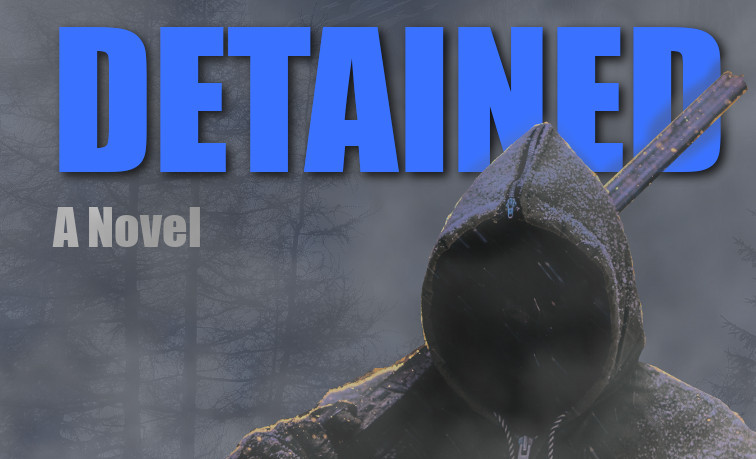I’ll be posting one chapter of my novel Detained every week throughout 2021. Download links below!
11. Candace
When Mike re-entered the bar area, trailed by a short, angry-looking female soldier, Candace was startled at how beat-up he looked. His demeanor was grim, and her relief at seeing him look relatively whole and healthy gave way to sudden apprehension. She looked at Glen, who was leaning against the bar with her, and then at Jack, who stood behind it, and exchanged worried looks with each.
“You look like a man could stand a whiskey,” Jack said, keeping his deep, rumbling voice low.
Mike nodded. “Jesus, yes,” he said, sitting—or, more accurately she thought, dropping into one of the stools unsteadily.
“Jimmy?”
A complex wave of emotions ran over his face as Jack slid a slopping shot glass over to him. “In the back. He … he was a hero back there. You left the monitor on—”
She gasped.
“—and he distracted them so I could turn it off. Your Mr. Haggen’s a hero.”
Wow, she thought. Not a phrase I ever thought I’d hear.
“Where’d you learn to fight like that, son?” Jack asked. “You had moves.”
Mike looked at Candace. “I picked up a few things in my travels. I spent some time training with a bunch of mixed martial arts fighters. Just to learn.” He rubbed his jaw. “Jimmy gave as good as he got, though.”
Mike picked up the shot glass and looked around. He leaned in close. “Did you find out anything?”
Glen cleared his throat. “In fact, she did. She found out that Dr. Raslowski there is a world-famous physicist.”
“Who left his swanky job under mysterious circumstances last year,” Candace added.
Mike frowned. “A goddamn physicist?”
Glen assumed a pose Candace recalled well: Teacher at lecture. Even in gym class, Mr. Eastman had been fond of offering tidbits of history and other subjects, often telling them that just because gym class was for their bodies didn’t mean they couldn’t also expand their minds. She also recalled the whole class groaning dramatically whenever he launched into one of his lectures.
She had no urge to groan now. She looked around to make sure the soldiers weren’t near them, listening in.
“He worked at the Holzman Institute,” Eastman said. “Which I’ve heard of.” He looked down at the floor suddenly. “Not, mind you, that I really understand what they do there. out of my league, definitely. It’s wild stuff. You heard of String Theory?”
No one reacted. After a moment, Mike sighed. “I have, sure.”
Eastman nodded, looking up with an expression that Candace thought she would classify as excited. “String Theory’s the simple stuff compared to what they were doing at the Holzman. We’re talking fundamentals of the universe here. Like, the basic building blocks of reality, that kind of stuff.” He looked down again. “Like I said, I don’t claim to really understand it all. But that means our Dr. Raslowski is one of the most brilliant men in the world. Who got fired for ethics violations.”
Mike blinked, every part of his body seeming to ache and burn. “Oh, shit.”
“Oh shit is right,” Eastman said, nodding. “I think we know something else, too. That old factory up the road? You said was blazing with light, crowded with people? Someone’s been cooking up something in there, and they lost control.”
“Lost control of what?” Candace asked.
Eastman shrugged. “Who the fuck knows? Like I said, I don’t claim to understand the man’s work.”
Mike sighed. “You put the words fundamental forces of the universe and lost control together, and—”
“—we’re fucked,” Jack finished, sounding, Candace thought, cheerful.
She shook her head. “That doesn’t make sense, though. Why us? Why come here? If they lost control of … something—I don’t know, say they got Godzilla up there and he snapped his chain—then why in fuck would they think they were safer here? Or better able to run things from here?” She shook her head. “It doesn’t make any sense.”
Mike downed his whiskey and coughed. “Mr. Eastman?”
Eastman rubbed his chin. “I’m no expert, but if I had to have a theory I’d say you have to apply the old Occam’s Razor. What’s the simpliest explanation for needing to be here?”
After a moment, Mike nodded. “Us.”
Eastman nodded. “Us. We’re the only thing here that can’t be replicated, that can’t be found anywhere else. It could be. It’s possible. I know it sounds nuts, but it’s logical. Therefore it’s possible.”
Candace frowned. She felt like she was running on an ice rink, trying to keep up without falling on her ass. “So what does that mean? Why would they need us?”
Mike gestured at Eastman, who shrugged. “I don’t know. They don’t seem to want anything from us. They seem content to just sit on us.”
“Like they’re waiting for something,” Mike said, looking around. “If there was an accident, maybe they don’t know if it’s a chain reaction or something.” He nodded to himself, warming to a concept. “Think about it: If we assume they’re up there at the facility tearing open the fabric of reality or something, and there’s an accident, the first step might be containment, right?”
Eastman nodded, so everyone else nodded.
“So, what’s the containment area? How far does the problem extend, whatever it is? Maybe they know, maybe they don’t. Maybe this bar lies inside some sort of Red Zone, or maybe they’re just being careful. Either way, maybe Dr. Raslowski runs the numbers and says, okay, if nothing happens in the next ten hours, we’re golden. So they might decide to sit on us and see what happens.”
“So then why not just observe?” Candace said. “Why shoot poor Mr. Simms? Why keep everyone in here?”
“Someone panicked,” McCoy said.
“Or maybe our actions have something to do with it,” Mike offered. “I don’t claim to understand the fundamental forces of the universe either. Maybe they need us to stay put, and the only way to guarantee it is to hold us by force.” He sighed, rubbing his eyes. “I don’t know. I’m just glad the man’s not a Structural Biologist and we’re not going to die of some alien virus.”
“None of this changes anything for us,” Eastman said. “It’s exactly the same situation. We’re trapped in here with armed soldiers who have demonstrated they’ll kill us. The only difference is that now we have to worry about wormholes or something.”
They all stood in silence for a moment. Candace found herself taking a physical poll, checking herself for injuries. She couldn’t believe in the chaos she’d escaped without a scratch.
“So what’s the point, then?” McCoy asked, pouring Mike another shot of whiskey and then taking a sip straight from the bottle. “We just sit here for the next nine hours, asking permission to take a piss and hoping we don’t accidentally piss off a jumpy kid who’ll shoot us dead?”
“There’s another problem,” Mike said, picking up the second shot and staring at it. “These soldiers. You notice they don’t have any identification? No nametags, no patches, no insignia. They’re not in communication with anyone that we’ve seen.” He looked around. “They’re off-book. They’re unacknowledged. Or, you know, private, someone’s private army. Officially, they’re not here, right? Which means none of this is happening, officially. That’s their fallback—if everything went according to plan, there would be a cover story. Some explanation. Or we’d just be warned that no one would believe us. They’d just deny anything ever happened.”
“So?” McCoy asked, taking another slug from the bottle.
“So, they killed a man,” Mike said. “Now they have a mess, and they have a bunch of witnesses who might make it a point to seek justice or revenge or whatever.” He slammed back the shot and put the glass back on the bar. “And we know some names. I will bet you Hammond or Raslowski or some of the grunts are thinking, right now, that maybe the cleanest thing to do is kill us all.”
Another round of silence met this. Finally, McCoy shook his head. “Naw. Simms was an accident. A mistake.”
Mike nodded. “And when the nine hours is up and they all breathe a sigh of relief because their little problem didn’t happen again? They’re going to allow us to just go our merry way, to call police and journalists, to hire investigators to look into Simms’ death—and the facility down the road?” He shook his head. “I know people with money and resources. Rich people. When you have money and resources, you start to think you can make any problem go away, and it makes you cruel and it makes you do things you shouldn’t do. And no one has more money and resources than the U.S. government.”
“If it is the government,” Candace mused.
“Oh, it’s the goddamn government all right,” Glen Eastman said dourly, “but let’s not forget all of this is conjecture,” Eastman said. “We’re still operating with a real deficit of actual information. We could be way off.”
Mike nodded. Candace thought about it. “But Mr. Simms is dead,” she said. “And we know who killed him.”
McCoy looked at her. She held his gaze. She’d known Jack McCoy pretty much her whole life, and he knew she wasn’t one for panic or hysteria.
“And since we don’t know why they’re so terrified of any of us getting out of this bar,” Eastman said, “we can’t in good conscience leave, can we?”
McCoy raised one bushy eyebrow. “What’s that?”
Mike nodded, and Candace knew what he was going to say. “I agree. We shouldn’t try to get away. We don’t know what’s happening. If there’s something that could endanger other people, we have to stay here. Until we know exactly what’s happening, I think we have to do everything except escape.”
“Then what do we do?” McCoy asked slowly, as if still processing this suggestion.
Again, Candace knew what Mike was going to say, and she felt a thrill when the words were spoken out loud. “We can’t run away. But we can’t wait to find out if they just liquidate us. We have to turn the tables. We have to take over.”
EPUB | MOBI | PDF





